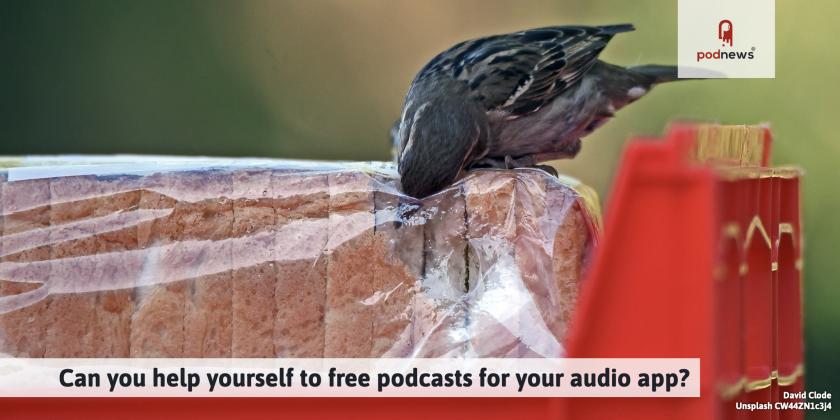
Can you help yourself to free podcasts for your audio app?

This article is at least a year old
In late November, a new audio app called Storier FM launched.
The idea was a sound one, in both senses of the word. The company writes on their website:
“Storier was created for the families who care deeply about the content their young children consume, yet who are dissatisfied (and disgusted) with the way large media companies target kids and fail to deliver guaranteed-to-be-kid-safe content through screen-free mediums.”
For $8 per month, parents could listen to a number of audiobooks, “Kidcasts”, and podcasts.
“We’d noticed that they started following us a few weeks ago,” one podcaster told us. “We thought it was just another podcatcher joining the fray.”
But then, this podcaster noticed that their podcast was there, behind the paywall. “We had never allowed, agreed, signed any agreement with them,” they added.
Chatting with other children podcast producers, it appears that many podcasters were in the app, with access to them being charged for - but none had signed an agreement.
Luminary
Back in April 2019, Luminary burst onto the scene, but without some major podcasts. Their plan was to sell subscription access to premium podcasts; but to include all podcasts on the platform, for free. Some felt that their podcasts were being used as 'bait’ for the premium podcast app - especially since Luminary had posted a cheeky tweet attacking podcasts with ads.
Like Storier, Luminary had used free, open RSS feeds as free content for their app. And, like Storier, creators weren’t happy.
The then CEO of the company, Matt Sacks, posted a long piece explaining what Luminary was doing. It wasn’t Luminary’s only misstep, but it wasn’t a great start.
Majelan
In June 2019, in France, Majelan appeared on the scene. It, too, had used open, free RSS feeds to populate its podcast app, which also promoted paid-for subscriptions for additional shows. French podcasters were not keen, including Majelan CEO Mathieu Gallet’s former employer, Radio France.
Majelan closed in June this year.
Storier
Approached for comment, Storier told us:
We’ve talked with quite a few podcast creators. Many were super excited about what we were getting ready to offer and wanted to be on Storier. They realized that their built-in requests for support (e.g. Patreon) would still allow them to be paid because Storier would help them get more exposure. Initially, we took this to mean that we could help podcasters by doing what all of major podcasting platforms do: Distribute the podcasts for the content creators. Though the large distributors don’t have a paywall, they are certainly still monetizing the podcasts by collecting user data and offering targeted ads in their other channels. We mistakenly thought that a paywall would be similarly viewed by the podcast creators. Within hours of the first podcaster expressing disdain that their content was behind a paywall, we decided to remove all podcasts from the platform and reassess our model.
In January of this year, we carried an opinion piece from Yann Rieder, pointing out that apps that “diverge from the expected behaviour of a standard podcast app” should never import podcasts to their directories.
The unwritten rule, and one that seems to be underlined by Yann’s piece, is that only if you’re an ordinary podcast app you should be fine using open, free RSS podcast feeds without asking.
“Ordinary podcast apps” - where you can subscribe to any RSS feed - include those like Castro, Pocket Casts, and even Google Podcasts.
However, Yann says, apps that “arbitrarily pick and choose podcasts”, or that sell their own content on the same app, should ask first. Especially for those, like Magelan and Luminary, he says “it is not difficult to come to the conclusion that they created a podcast app to lure listeners in, with RSS feeds they have culled from the Apple Podcasts’ herd, as a means to then sell a subscription to their own, locked-down content.”
Following advice, Spotify, Deezer and Amazon Music launched without populating their apps with open RSS feeds: preferring that podcasters made the decision to be listed by their platforms.
Storier told us:
We are learning from this and are seeking to do what is right for all involved parties. Importantly, we value and appreciate the hard work of content creators, and hope that we can work together in the future through formal licensing deals, as we sincerely strive to build the safest place for kids to explore, laugh, and learn.
Podcasts were removed from the app “before they had a single paying user”.
Podcasters, however, note the differences in their approach. “It seems,” one told us, “that they 'got permission’ to use audiobooks and music but didn’t bother with podcasts.”
If you’re podcasting to children, and you’d like your podcasts on Storier, you can contact them here.

































































































